#general: history
Text
In Lestoire de Merlin, Arthur’s ability to pull the sword from the stone amounts to an “election” to the kingship by God, a point that is repeated more than once as the Archbishop convinces the barons of Arthur’s right to the throne. The barons eventually agree to Arthur’s accession on the grounds that it is an enactment of God’s will. This divine confirmation of the king was a romance trope. In romance, dynastic legitimacy tends to be signaled by obvious means: Perceval of Galles, for example, is recognized by Arthur because of his physical resemblance to his father. His upbringing in the wilds of the forest does not alter visible marks of his heritage.
Divine support for legitimate inherited kingship in romance was in keeping with the theory of succession in medieval England and France, if with a strong element of wish-fulfillment in the undoubted identification of heirs. By the thirteenth century, the heir began to rule on the day of the old king’s death, rather than on the day of the coronation; there was no interruption to the king’s “body natural” and the descent of the Crown from father to son was understood as the manifestation of God’s will. The purpose of this was to avoid precisely the situation that arises in the Arthurian story, where dissension and delay over the choice of an heir leads to over half a year without a king.
Ironically, disrupted successions in late fifteenth-century England turned on occasion to the romance trope of the return of the lost rightful heir to prop up dubious claims. Although Henry VII preferred to emphasize his conquest of the throne rather than his hereditary title, which was indirect at best and cut out a number of other possible claimants, he exploited his dynastic association with Arthur to bolster his legitimacy. The expectations of romance and reality reinforced each other in the desire for a divinely sanctioned king.
– Ruth Lexton, Contested Language in Malory's Morte Darthur: The Politics of Romance in 15th Century England
9 notes
·
View notes
Text
TIL a family in Georgia claimed to have passed down a song in an unknown language from the time of their enslavement; scientists identified the song as a genuine West African funeral song in the Mende language that had survived multiple transmissions from mother to daughter over multiple centuries (x)

86K notes
·
View notes
Text
#Star Wars#Mass Effect#Transformers#Destiny#Halo#Star Trek#science-fiction#lore#history#public opinion#Star Wars: Knights of The Old Republic#Mass Effect 2#Transformers: The Covenant of Primus#Destiny 2#Halo: Combat Evolved#Star Trek: Enterprise#Star Wars: The Old Republic#Mass Effect 3#Transformers: Generation 1#Halo 2#Star Trek: Voyager#Star Wars: The Clone Wars#Destiny: The Taken King#Transformers 2007#Halo 3#Star Trek: The Next Generation#Star Wars: Plagueis#Transformers: Exodus#Destiny 2: The Witch Queen#Halo Reach
9K notes
·
View notes
Text

†
#painting#art#artblr#artists#oil on canvas#oil painting#dark art#macabre#goth#gothic#vampire#witch#dark academia#artist#classical art#ai generated#witchcraft#vampires#vampire aesthetic#vampirecore#vampcore#art community#witchcore#art gallery#art blog#art history
2K notes
·
View notes
Text
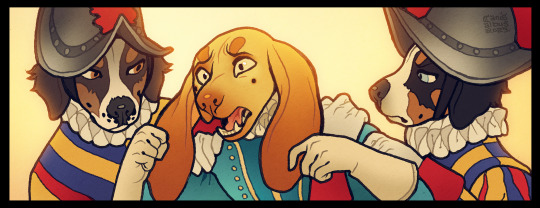
What if I told you that RoobrickMarine went and wrote an entire novella starring my 16th century dog couple? It's very canon-adjacent, well researched and thoughtfully put together, has inspired me a ton during these past months and it's now publicly available at AO3. I highly recommend it.
✦ Separation ✦

#content warnings for sex violence self harm and general angst#six chapters 41K words#people who have asked for longer stories of these two please give this one a look#I've watched this unfold since late may? early july? and it's been an exciting experience#I'm not a writer I think it's better than what I could've come up with#honestly though the way he managed to get inside Machete's and Vasco's heads was uncanny their mannerisms and thought processes are spot on#some of the events aren't canon but they might as well be#and most of the background details and backstory tidbits are accurate believe me he's very well versed on their lore#big history nerd so the worldbuilding is intense#you get to meet the dog pope#there's saint sebastian#roommate hijinks#it gets kind of bleak at times though so be mindful of that#it's not all fluff and good feelings#Separation#Heinaven#RoobrickMarine#own characters#own art#artists on tumblr#CanisAlbus#Vasco#Machete#anthro#sighthound#dogs#canine#animals#if you end up reading the whole thing it would be really sweet if you left a little comment as a thanks for his hard work
6K notes
·
View notes
Text


[left: Palestinian woman holding key to home now under Isr*eli occupation]
[right: Keys hang from a tapestry at a school in Aralez, Armenia, representing the keys to homes left behind by the survivors of the Armenian Genocide]
we will return.
#armenian#culture#west asia#palestine#Palestinians#freepalestine#Armenia#armenian history#indigenous#Middle East#generational trauma
4K notes
·
View notes
Text



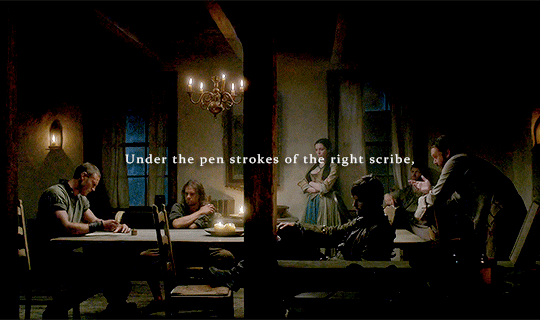

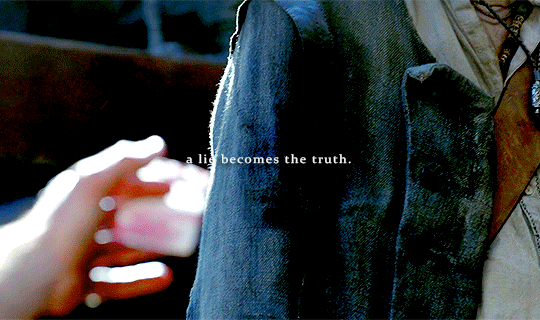
Ask a historian, “What was mankind’s greatest invention?” Fire? The wheel? The sword? I would argue it’s history itself. History isn’t fact. It’s narrative, one carefully curated and shaped. Under the pen strokes of the right scribe, a villain becomes a hero, a lie becomes the truth.
-Gaal Dornick, Foundation
#black sails#blacksailsedit#james flint#billy bones#bs max#bs madi#vcreations#vgifs#i will watch a show and think now how do i make this about black sails more r coming#eh i hope this makes sense 1st gif is general history 2nd gif old wives' tale 3rd gif when max said the pearl has no history#my own pet peeve is i dont like reusing scenes i used as gifs before so this couldve turned out better ig
3K notes
·
View notes
Note
Hi I was wondering if you know of any good resources to get good vintage names that aren’t typical and boring (Fred, Edward, Alfred etc)?
Some of the names in the Santa letters are certainly peculiar and it made me wonder what kind of names those “vintage baby names” lists are leaving out 😜
Thanks! And happy new year 🎊
One place to get a good general overview of what names were like in a certain era is the Social Security Administration's lists of popular names that go back to the 1880s. The further down the lists you go the less common they get. However these are still all names that had at least a few hundred occurrences, so you're not going to have any Gloyds etc..
I personally always try to find names from primary sources (newspapers, census, vital records, etc.) as you're more likely to come across unusual names that don't make the top 200 lists.
Also keep in mind that name popularity varied greatly by location. Just because there were a bunch of Juanitas in Tulsa in 1930 doesn't mean there were that many in Boston.
Honestly if anyone is working on a specific project and needs names from a certain location/era (i.e. you're writing a novel that takes place in London in 1627) feel free to message me and I'd be happy to work with you to compile a list from primary sources. I love this stuff and will use any valid excuse to spend an evening digging through 17th century baptismal records.
#if you buy me a coffee I might even make you a simple custom name generator#I do this for myself all the time because I'm a party person who really likes spreadsheets#names#history#historical fiction#writing resources#asks#@sir-sleepalot#writing reference#character names
2K notes
·
View notes
Text

Happy pride month from some fancier-than-my-usual corner of the 1770s!
#my art#digital art#history#pride#lesbian#hell yeah lets see if giving this pretty general tags gets it more notes who knows#heavily inspired by a few different sources but esp 1910s-1930s illustrations of casanova's memoirs#and also legal cases against Female Husbands
6K notes
·
View notes
Text
would you tell a Native American person you know their history better than them?
would you tell an African American person you know their history better than them?
would you tell any minority group you know their history better than them?
no?
then why the fuck are you doing that with Jews?
#I'm so fucking tired#antisemitism#jumblr#jewish#judaism#israel#israblr#ישראבלר#ישראל#jewish history#am yisrael chai#like it or not Israel's history is part of Jewish history as well#because it's a Jewish country created by JEWISH PEOPLE#not all Jews are gonna know Israeli history that well sure#but Israeli Jews sure will#and even diaspora jews need to know a bare minimum because the existence of the state directly affects them#and obviously this is also about general antisemitism which I'd say diaspora jews probably know more than Israelis
1K notes
·
View notes
Text
Damian: Father, where is Alfred? I need his counsel on an issue.
Bruce: He stepped out for some errands, but I can help in his place. What's the issue?
Damian: No. Even I am more knowledgeable in the ways of the heart than you. I shall wait for Alfred's return.
Bruce mouthing: In the ways of the heart?
Later that evening: ........
Bruce: Did Damian talk to you about his problem today, Alfred?
Alfred: Yes, Master Bruce. The lad seemed to be sweet on a classmate and was seeking guidance on how to approach the young man.
Bruce: Why didn't he come to me!? I could help him!
Alfred: Seeing as you failed to get Jack Fenton to glance in your direction, let alone consider you a romantic partner, I fail to see how you would help Master Damian with Danny Fenton.
Bruce: Jack Fenton has a son!? A son Damian fancies!?
Alfred: Yes, he does. Interestingly enough, I had a similar conversation with your father back when he learned Anthony Fenton's son was Jack.
Bruce: I can't believe this. It's always the Fentons. WHY CAN'T THEY EVER LOVE US BACK?!
Alfred: Well, you know what they say. The third time is the charm. Perhaps Master Damian will have better luck than you or your father did.
Bruce: Do you really belive that?
Alfred: Oh not at all. I've seen the way Mr.Fenton looks at Master Damian. That is not the expression of a boy who fancies someone. Rather, I would say it's the one a butcher aims at a cow for slaughter.
Bruce sighing: And the cycle of heart break contuines.
#dcxdpdabbles#dc x dp crossover#From a fic I never worte#Ever heard of generational trauma? Get ready for Generational Heart Break/ One-sided love#In which Bruce watches history repeat itself#Alfred has seen three generations of Wayne fail to romantic a Fenton#Danny doesn't trust Damian because he thinks Damian is working for the GIW#It's just his Robin slipping though his civilian persona#Bruce still wakes up in the middle of night thinking of Jack
729 notes
·
View notes
Text
The literature of the medieval aristocracy is suffused with the language of honour. It portrays a culture obsessed with reputation, with individual and collective pride, with avoiding shame and taking forceful, frequently violent, revenge for insults.
[...]
Yvonne Robreau has demonstrated just how complex medieval notions of honour could be through an exhaustive study of honour and shame in the fourteenth-century Lancelot-Grail Cycle. Honour is expressed as something ‘interior’, a matter of an individual’s worth, that must be defended and protected from insults. Yet it is also spoken of as an abstract commodity that can be gained or lost through actions. Furthermore, honour can be a verb: one could ‘do honour’ to another, by surrendering to a superior opponent in combat, by welcoming them with appropriate ceremony or by giving suitable gifts. There are also a number of other words with parallel or similar meanings, such as gloire, nom, renom, los, hautesce, digneté and pris.
James Titterton, 'Por pris et por enor: Ideas of Honour as Reflected in the Medieval Tournament' in The Medieval Tournament as Spectacle: Tourneys, Jousts and Pas d’Armes, 1100–1600
7 notes
·
View notes
Text
sure it was a perfect storm of a pressure cooker but i promise destiel was about destiel
#like 2020 was all building towards something. the isolation the pandemic the general uncertainty of day to day life#toss in the heated election and counting process. sure it *couldve* been anything else. but it *wasnt*.#it was destiel. that night there were even other rumours circulating about other shows. another show even had a huge reveal!#but the most widespread and known was destiel because of course it was! because thats what everyone was losing their mind over!#look at the statistics chart of a history of destiel interest over time! i promise the destiel interest is about destiel!#were people all equally invested? no! were some people memeing? yes! but by and large nov 5th became a juggernaut bc of destiel#as someone who literally was refreshing for election news and developed mania from seeing destiel go canon. it was about destiel#sure the intersection of destiel and election results was fun. but i posted way more destiel than election stuff. cause it was about destie#anyway. idk why im on a soapbox#char speaks#destielputinelection#destiel
1K notes
·
View notes
Text
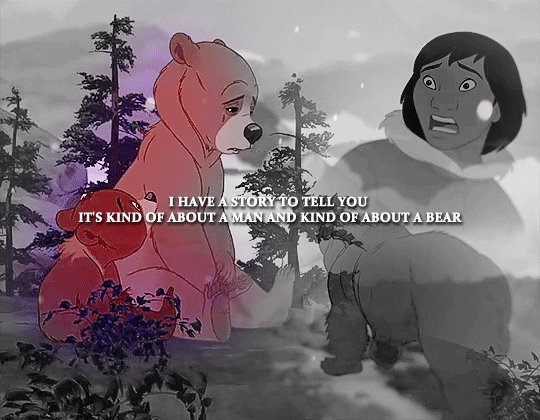
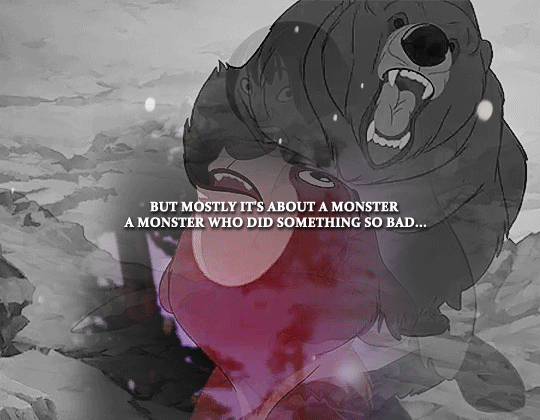
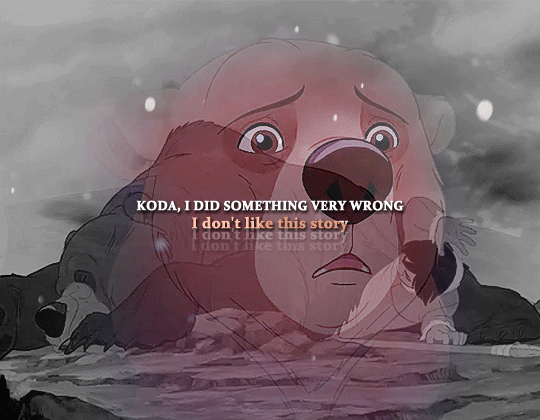
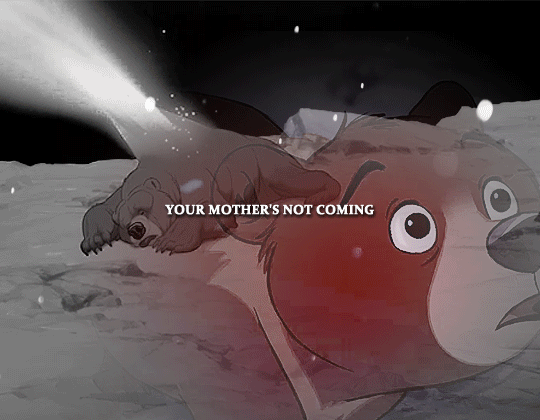
♫ Everywhere I turn I hurt someone. But there's nothing I can say to change the things I've done. I'd do anything within my power. I'd give everything I've got. But the path I seek is hidden from me now. Brother Bear, I let you down. You trusted me, believed in me and I let you down. Of all the things I hid from you I cannot hide the shame ♫
#brother bear#disneyedit#animationedit#filmedit#moviegifs#disneyfeverdaily#animationsdaily#userrobin#usergif#useraurore#userbbelcher#nessa007#fyeahmovies#gifs#my edits#so sorry you guys for all the tears you can possibly get from this gifset#but if I had to name the saddest moment in disney animation history after mufasa's death#it would certainly be this speech and movie in general (to me)#I still freaking cry every time I rewatch this part of the movie 😭😭😭
586 notes
·
View notes
Text

by majara__
#painting#art#artblr#oil on canvas#oil painting#strong female character#dark feminine aesthetic#dark feminine energy#feminine#dark academia#ai generated#aesthetic#fantasy#dark fantasy#fairycore#fairytale#fairytales#moon#academia aesthetic#artist#art community#art gallery#art blog#artists#snow#art history#classical art
2K notes
·
View notes
Note

thesis about the sea peoples you say? may i request an infodump about the sea peoples?
Heya!
So, basically in college (undergraduate) I got really obsessed with the questions around the Collapse of the Aegean Bronze Age, mostly because I wanted to set my big Magnum Opus historical fiction novel in that time, and the deeper I dug into the rabbit hole the more it appeared that no one, absolutely no one, actually knows why the civilizations around the Mediterranean all fell from a state of pretty sophisticated internationally-trading civilizations to literal Dark Ages (all except for Egypt which was substantially weakened and never really recovered), all at once around 1200-1100 BCE.
The Sea Peoples are the names of the only contemporary (Egyptian) account we have that names who might have been responsible if this collapse was due to an invasion. It's a popular theory because a viking-style invasion is a much sexier reason for a civilization to collapse so we all gather around it like moths to flame. But the thing is, there's a lot of contradictory evidence for and against and shading that hypothesis.
Suffice to say, literally no actually knows what happened and almost every answer comes up, "Some combination of these things, probably?"
But what makes the Collapse even more interesting from a modern perspective is that if there was a historical Trojan War (and I think there was) as fictionalized in the Iliad and the Odyssey (and Song of Achilles, for the Tumbrlistas), then it would have taken place within a generation of the entire civilization that launched the Trojan War crumbling to dust.
So like, if you're Telemachus, your dad Odysseus fights in the Trojan War, some even manage to get home, and then like... everything goes to shit. Catastrophically. And doesn't recover for 400 years.
Seriously, they lost the written word, like how to actually write things down and read them and it took 400 years to get it back. That's how fucked shit got during the Collapse of the Bronze Age.
So my thesis was asking: what if these two things were related? What if the Trojan War either led to the Collapse or it was part of the Collapse or it was a result of the Collapse? Because the timeline is so unknown and muddled that it really could be any of those and again, that's if the Trojan War isn't entirely fictional (which I don't think it is, but many academics disagree, it used to be a whole thing up until Schliemann dug it up, and many doubted it was ever a historical event even after that.)
Ok, so at the risk of writing 75 pages on this again, let me just say:
My conclusion (more of a hypothesis proposal ultimately since there are so many gaps in our knowledge) was that the Trojan War took place before the Collapse of the Bronze Age. But, it might have been launched in response to a wider breakdown in trades routes and resources, causing the Greeks to launch the campaign basically as a bid to replenish their own coffers because they were getting squeezed by what they didn't know was the first rumblings of a global domino effect.
Therefore, since taking out Troy didn't solve those larger trends and forces, they all went home and then got slammed by the REAL problem, which was all the people who had been displaced from further away by this rolling drought or invasion or whatever that was disrupting these delicate international trade routes.
But the Greeks might have been part of the Sea Peoples too! Our only record of the Sea Peoples is from the Egyptians in a highly propagandistic text which makes them sound like this big fearsome foe but that might have been because saying, "We slaughtered a bunch of desperate refugees at our border who were looking for shelter," didn't sound as cool. If the Greeks (or Achaeans or Ahhiyawa) got swept up in this slow-rolling collapse/displacement of people, then they absolutely could have been among those refugees who crashed against the shores of Egypt.
A lot of my evidence was based on looking at how Troy was sacked (it was stripped literally down the nails and there was a lot of evidence of a long-term siege, like what we read about in the Iliad) vs. how Mycenae (Agamemnon's city) or Pylos (King Nestor's city) was sacked, where they were burned and stuff was stolen but they weren't stripped, it looks more like a standard looting hit-and-run type thing. Which led me to believe that it was different turmoil that rocked Mycenae and Pylos than what led to the sacking of Troy, despite the fact these things happened within about 20 years of each other. (Helen being a made-up reason for a resource-driven war would only be the oldest trick in the book, as far as propaganda goes, after all.)
But really, the craziest detail I'll leave you with is: we just don't know! And then it gets weirder. Because the Hittites fell at the same time so the Hittites scholars say, "Nah, the Sea Peoples weren't Hittites, they were probably Greeks." And the GREEK scholars say, "It wasn't us, it was probably the Hittites or someone else. " and the EGYPTIAN scholars say, "Yeah it was someone north of Egypt, maybe the Hittites or the Greeks." and the LEVANT scholars say, "It wasn't from the Levant, we know what was going on there, it has to be from somewhere else."
Literally every single possible source of the Sea Peoples has the scholars who specialize in that location saying it's not them and it must be the guy next door.
It's maddening!
And then there's a big ol' gap around Bulgaria and the Black Sea because, oh yeah, the Soviet Union forbade archaeology in those areas to quash any local pride so those places that were behind the Iron Curtain are decades behind on scholarship that would allow them to say, "Oh hey, it was actually us! Yeah, the invaders came from Bulgaria and got pushed down by a famine." or something to that effect.
We also have some histories from the time saying that the Sons of Heracles returned not long after the Trojan War to lay Greece to waste! And it's really evocative and sounds like it fits what we've got of all these burned cities that happened right after Troy fell! Except that's in doubt now too!
The latest theory is that it was climate change that led to a massive drought. You can read about it in the latest and most popular book on the subject, 1177 BCE which I highly recommend because if it had existed when I wrote my thesis, I wouldn't have had to write it.
But I disagree with the conclusion! Or rather, I'm skeptical. Because very decade, the problems of the day have been hypothesized as being the cause of the Collapse. Like, in the 60s, there was a theory that maybe it was internal strife around a labor strike, like the French Revolution. And y'know when there's a world war, they think it's an invasion. And there was a theory that it was 'cuz of an earthquake (I think that one is nonsense, Mediterranean civilizations famously bounce back quickly from earthquakes.) And now that climate change is on our mind, I'm a little weary to see that it's the new theory because it feels way too much like we're just projecting our problems onto this giant question mark.
Was climate an aspect! I think so! I think it might have contributed to the break down in trade routes that made everyone in the Mediterranean really stressed out and hostile and warlike and led to a lot of displacement. I'm not sure if it's the only reason though and I think the book just kinda reiterates everyone else saying, "I think it was this but in the end, we just don't know, and it was probably a lot of things." which we've known for ages so it's just repeating all the same conclusions. *sigh*
... Like I said, I wrote my thesis on this so yeah, I could go on for a while lol.
#ancient history#bronze age#collapse of the bronze age#sea peoples#lots of generalizations here for brevity so don't jump down my throat if you are also familiar with this era plz
463 notes
·
View notes